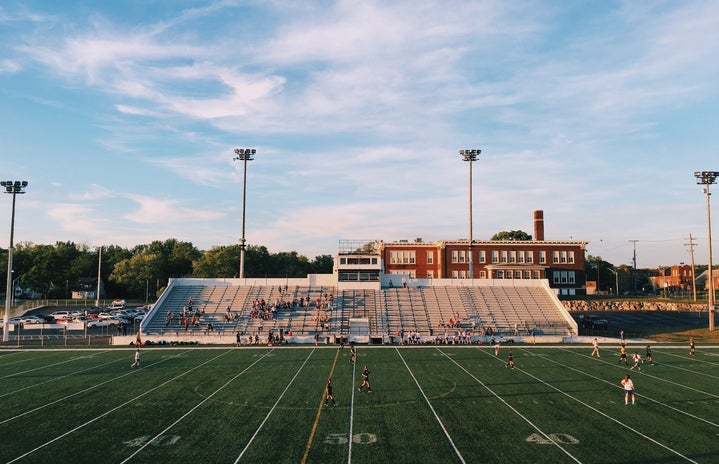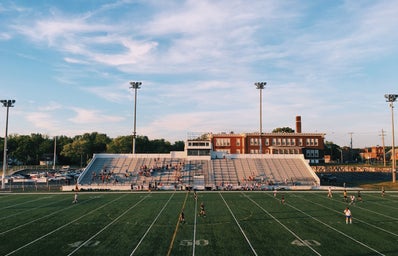During the winter of junior year of high school, it occured to me that as one of the top twenty nationally ranked female athletes in the U.S., I should be looking into collegiate fencing. I came to the recruiting process late, however, which resulted in a rushed and uphill battle to decide which schools to prioritize and which coaches I liked most. I knew I was strong enough academically to hold my own so it became about finding the right team, right environment, and right academic rigor. In about two weeks, I narrowed my search pool down to six or seven schools. Of those schools, Harvard had already filled its recruiting spots with two of the best ranked girls in our division. I eliminated Notre Dame and Princeton because I liked the more liberal environment of northern states. That left Temple, Northwestern, Yale, and Penn. I adored the Temple coach whose motherly charm and competitive drive reminded me of my grandmother who had passed away a few years ago. That said, I wanted a more academically rigorous environment and more freedom during the competitive season to pursue other goals. In the following month I visited Chicago, Philadelphia, and New Haven to get a better feel for each individual environment. At each school, I was greeted with open arms. I sat down with each individual coach and discussed my academic and athletic goals. I expressed that I wanted the freedom to take a semester abroad, compete internationally, and continue my pursuit of a spot on the Olympic team. They responded with enthusiastic support and inspirational spiels about what made their team so great.
When I arrived on Penn’s campus, I had my rose-tinted glasses on and was ready to be impressed. I was amazed by the blossoming trees and gorgeous Locust Walk; I yearned to become part of the Penn community.
I walked into the head coach’s office excited and ready to commit. The tour of the fencing gym left me astounded. In my opinion, Penn has one of the best fencing facilities in the world. It was almost futuristic. I was just as impressed by the head coach. He promised I would be able to continue to compete nationally and internationally (paid for by the team no less), and that I would get access to an amazing workout gym with an on-hand trainer to make sure I stayed strong and avoided injury. I would have access to amazing trainers to treat any pre-existing injuries; I would have a community of coaches who understood the importance of a good education and would always put my academics first; I would have the privilege to join a tight-knit team who travelled together, hung out together, and competed together. The coach even promised to push for the best financial aid package possible to ensure that I had the best pick of housing.
In retrospect, recruiting a top athlete is like a salesmen selling a used car. The coaches will tell you all of the amazing features of their respective universities, sugar coat all of the downsides, and diss all of the other options. The grandeur of Penn’s sales pitch made me feel like it would be wrong not to take their offer. Sure, I had never actually met the team and didn’t know any of the other recruits, but everyone around me told me Penn was the best option.
That summer, I submitted my early decision application and waited in gleeful anticipation to see years of my hard work, dedication, and sacrifice finally result in something fantastic.
Fast forward a year and I am standing at the threshold of a future with untold possibilities. I had met some of the other recruits and they didn’t seem to have the same dedication to the sport I had, but I rationalized that the other women on the team would impress me. I arrived sword ready the first day of practice and was regrettably disappointed. None of the upperclassmen bothered to show up and the new recruits were left to train amongst ourselves (I wouldn’t even meet my team captain until almost three weeks later). That day, I plowed my way through my other teammates and was left wondering if I had made the right decision. My new coach didn’t seem to like me and I couldn’t work hard enough to be adequate for him.
My doubt and indignation came to an apoetheosis the day of our team Rocky run. The premise: the entire team would run to the Philadelphia Museum of Art and climb the Rocky steps together to usher in the start of the regular season. This would be the run that ultimately ended my fencing career. I had sprained my ankle and asked my coach if it was smart for me to run, but he insisted that I comply regardless, wanting me to be part of the team event. He told me that we wouldn’t be running too fast and was sure I would keep up. Needless to say, he was wrong. The team run was more of an individual run done as a group and I quickly became one of the last runners. It was me, my coach, and another girl I didn’t know as well at the back of the pack. About a quarter mile in, I had to fend for myself.
PSA: It is common knowledge in Philly that the bike path is not the safest place to be running alone, especially for young women. Being new to the city, this was not information I was privy to. But, as I would later find out, all coaches were aware of this fact and an incident such as the one about to occur had happened on a team run in past years. I would later see that other sports teams that passed by me were all careful to run as a group.
A mile into my run I began to worry. I didn’t know the route I was supposed to take and hadn’t seen any of my teammates since I was left behind. Just as I began to debate stopping and waiting for the saber coach who was supposed to run behind everyone else and pick up anyone with injuries and bring them back, three men on bicycles rode past. One reached out towards me, shoving me to the ground. My sprained ankle buckled and I hit the asphalt. Scared and worried I wouldn’t ever catch my team, I picked up the pace and started sprinting. I didn’t stop till for four miles before it dawned on me that I hadn’t ever caught up to my team. I blocked out the throbbing in my ankle and ran all the way back.
About an hour after I had last seen my coach, one of the new recruits calls me and asks where I was, saying that our coach was beginning to worry. I explain that my ankle is hurt and that I may have run too far. The coaching staff sends one of the other team captains to walk me the rest of the way back. By this time, the eight mile run on my very damaged ankle starts to take its toll and when my teammate shows up, I am struggling to walk. In the first and few demonstrations of camaraderie I saw during my time on the team, he grabbed my arm and helped me walk back.
I emailed my coach and the other coach responsible for picking up fencers that got left behind later that evening, explaining what had happened and told them I would miss some practice until my ankle healed. I would never hear back from my coach. What followed was a battle between me and the coaching staff to figure out how to move forward. Traumatized by the incident, I felt betrayed by my teammates and my coach. He proceeded to blame me for the event and berated me in front of his superiors, none of whom stepped in in my defense. Eventually, my parents got involved. But when it became clear that my coach did not want to teach or support me, I quit the team.
The intent of this article is not to accuse the Penn fencing team or suggest that my experience is common place in Penn athletics, but rather to send an important message about Penn recruiting and the college recruiting process in general. Don’t get so swept up in the coach’s sales pitch that you overlook the important details. Get to know your team before you sign up for four years with them. Most importantly, fact check all the information you are given and take the rose-tinted glasses off. Imagine what your life would be like on that campus and reach out to past and present team members to get an idea of what it’s like to be on that team. While I appreciate the opportunities I have earned here at Penn and enjoy being a Wharton student, I also miss being part of a real team and competing alongside my family. My dad once told me to“find a team you can not only win with, but lose with too.” Unfortunately with my experience, I lost out all on my own. Still, one experience is not indicative of others so I encourage you to take my piece with a grain of salt, but also heed my words.


